Annual Report 2023



The NSW Small Business Commission acknowledges that Aboriginal and Torres Strait Islander peoples are the First Peoples and Traditional Custodians of Australia, and recognises their continued custodianship of Country –land, seas and skies. We acknowledge the diversity of First Nations cultures, histories and peoples, recognise their enduring connection to our State, and we pay our deepest respects to Elders past, present and emerging.

Small business is the backbone of our economy and the heartbeat for our communities. There are now some 850,000 small businesses across NSW, which make up 98 per cent of all business in the State, employing 1.7 million people. Small business owners and operators are vital to the economic wellbeing and way of life in NSW.
The last few years have been extremely challenging and 2023 was another difficult year for many small businesses. Despite unprecedented challenges, many of our small businesses showed remarkable resilience and capacity to reinvent themselves.
Not surprisingly, latest data again confirmed the significant economic contribution of small businesses to our economy, with annual sales and service income increasing by a further $40 billion and an additional $3 billion paid in annual wages and salaries.
I am very much aware of the vital role small business plays within our communities. Their generosity extends from sponsoring local sports teams to contributing goods and services, often being the first to offer assistance to those in need.
Just as small businesses support us, it is vital that we support them. That’s why the NSW Government has progressed important reforms to increase direct procurement opportunities for small business and reduce barriers to winning Government contracts.
The NSW Government is also providing important cost relief measures, including the revamped NSW Toll Relief program and the National Energy Bill Relief Scheme, a joint initiative of the Federal and State Governments, which is providing individual bill relief for eligible small businesses. In 2023 the NSW Government also launched the Service NSW Business Bureau, which offers free personalised
services to support small business. In early 2024 I look forward to the launch of the NSW Small Business Charter. The Charter will commit the NSW Government to stronger engagement with small business on the development and implementation of policy and regulation.
I would like to thank and congratulate the NSW Small Business Commissioner and his team for their support of small businesses. The Commissioner has provided valuable information and advice on key issues impacting small businesses as well as practical solutions to help address these matters and assist businesses. The ongoing work of the Commission is an important support service for the small business sector, providing businesses with effective representation and industry leading advocacy, tailored customer support and professional mediation services.
I look forward to continuing to work with the Commissioner in advancing the interests of small business and in ensuring NSW remains the best state in Australia to own and operate a small business.
Steve KamperMinister for Small Business
Minister for Lands and Property
Minister for Multiculturalism Minister for Sport
850,000
small businesses in NSW
Comprising 97 per cent of all NSW businesses1
$66.6B
annual wages and salaries
Paid by NSW small businesses to employees every year2
37%
living outside the Sydney Greater Metropolitan Region
Approximately 37 per cent of small business operators live outside the Sydney Greater Metropolitan Region3
1.7M
people employed
By NSW small businesses in the private sector, which is around 43 per cent of the State’s private sector workforce2
$465.3B
annual sales and service income
Contributed by NSW small businesses2
35%
of small business operators were born overseas3


Like many of their customers, NSW small businesses faced the challenges of a slowing economy and severe cost pressures in 2023, which contributed to higher insolvency rates, an increase in business exits and a drop in small business confidence as measured by our Small Business Momentum Surveys.
Most small businesses in NSW are not represented by a relevant industry or professional association.
This makes the role of the Commission even more vital in ensuring their experiences and needs are identified and addressed. In 2023 the Commission made policy development and advocacy an even higher priority in supporting the more than 850,000 small businesses across the State.
One of our major projects for the year was a comprehensive review of the NSW Retail Leases Act. The Act’s primary objective is to foster good leasing practices between lessors, lessees and
their advisers. The Commission sought the views of small businesses, property owners, the legal and property professions, and other stakeholders on the operation of the Act and how it could be improved. The Review also drew on the insights the Commission has observed and documented from over 10 years of helping businesses and landlords with lease issues.
The Review sets out 32 recommendations aimed at improving outcomes and ensuring the Act remains effective and efficient in promoting good leasing practices.

The Commission has also continued to advocate for the rights of small businesses as users of digital platforms and online marketplaces. We represented the interests of individual businesses where there were disputes or sudden loss of service, and through this representation provided results for impacted businesses.
It is critical that small businesses have a clear set of rights and processes to follow when things go wrong, including appropriate redress, especially when they are dealing with much larger entities. We saw this only too clearly with the Optus service outage in November 2023, when poor communication compounded the harm done. This is an issue we are continuing to pursue in 2024.
Demand for the Commission’s services remained at record levels in 2023, which is double pre-COVID levels. There were more than 13,000 requests to the Commission for assistance during the year, and more than 2,400 applications to use our mediation service, which helps small businesses resolve disputes inexpensively and efficiently.
Retail and commercial lease issues remain the core of the Commission’s caseload. More than half the requests for help were in this category.
Other milestones in 2023 included the launch of the Commission’s new website, with improved navigation and search capabilities, the launch of the Winning Business learning module, to help small businesses learn how to win contracts, and the publication of new guides dealing with the disruption from construction works and tips for local councils on strengthening their small business communities.
In 2023 we also celebrated the 10-year anniversary of the Commission and held the 7th NSW Small Business Month, featuring 700 events right across NSW.
Finally, I would like to take this opportunity to thank the entire team at the Commission who provide industry leading professional support, representation and information to the small businesses of NSW.
Chris Lamont NSW Small Business CommissionerThe Commission will advocate for the implementation of the Retail Leases Act review recommendations, better treatment of small businesses by online platforms, improved impact assessments of new legislation and regulations affecting small business, and ensure the voices of small business are heard so their needs are effectively considered and addressed.
Demand for the Commission’s low-cost mediation service is expected to remain elevated during 2024 due to challenging economic conditions and increasing awareness of the service as a more cost effective and timely alternative method of resolving disputes than a court or tribunal.
The 31-day festival of workshops, seminars and networking opportunities for small businesses across the State grows bigger and better every year. Standby for a new and improved format in 2024.
13,290
86%
95%
customer experience satisfaction score
445
464
business insight initiative engagements
526,360 businesses received direct support mediations conducted and 2,412 applications managed direct engagement sessions with industry, local government, State and Federal Government departments and agencies of customer calls answered within 60 seconds
submissions to inquiries and policy discussion papers
31 82 2
major reviews of key small business issues
unique website visits
92
news and help articles to keep small businesses informed
1. Construction
2. Retail trade
3. Rental, hiring and real estate services
4. Accommodation and food services
5. Professional, scientific and technical services
1. Retail Leases Act issues
2. General contract disputes
3. Commercial lease issues
4. Business to business issues
5. General civil matters

The Commission is undoubtedly one of the most proactive advocates for small-to-medium sized businesses. The Commission has unwaveringly and persistently championed our members’ and our sector’s issues and challenges, as well as determinedly sought fair and sensible solutions from the NSW Government.

The Commission advocates and represents the position and interests of NSW small businesses in matters related to regulation, red tape, treatment by larger businesses and government agencies. It also provides assistance with government support and grants.
Our focus is to create a more business-friendly economic and regulatory environment that supports the sustainability and ambition of small businesses. Major advocacy projects in 2023 included a review of the NSW Retail Leases Act and the development of proposed reforms to minimise the impact on small business of NSW Government construction activity. The Commission provided important policy recommendations in relation to reducing the use of plastics, country of origin labelling proposals for seafood in hospitality settings, and telecommunications and digital platforms. The Commission published new or revised guides on disaster preparation, dealing with local construction works and helping local councils support small business.
Department of Industry, Science and Resources
Country of original labelling for seafood in hospitality: discussion paper
The Treasury
Digital Platforms – Consultation on Regulatory Reform
The Treasury
Statutory Review of the Payment Times Reporting Act 2020
Parliament of Australia
Influence of international digital platforms
Productivity Commission
Early childhood education and care
Attorney-General’s Department
Review of the Privacy Act 1988
ASIC
Small Business Strategy
IPART
Issues paper – Review of early childhood education and care – April 2023
ACCC
CDR Active Data Holder Rectification Schedule
NSW Environment Protection Authority (EPA)
Feedback on the EPA’s draft survey for environment protection licensees about their climate change actions
Department of Industry, Science and Resources
Country of original labelling for seafood in hospitality: regulation impact statement
Department of the Prime Minister and Cabinet Draft National Care and Support Economy Strategy 2023
“The IBA has been a strong advocate for the inclusion of small bars in the Retail Leases Act. With the January 2023 updates to the Act championed by the Commissioner, a new era of support has dawned for small bar operators.”
Karl Schlothauer, President, Independent Bars Association

National Emergency Management Agency (NEMA)
Independent Review of Commonwealth Disaster Funding – Public Submissions
ACCC
Environmental and sustainability guidance
Australian Children’s Education & Care Quality Authority (ACECQA)
Review of NQF Staffing and Qualifications Regulations
NSW Department of Customer Service
New proposed Practice Standard for Professional Engineers
Safe Work Australia
Consultation on options to improve WHS incident notification
Liquor & Gaming NSW Alcohol delivery reform review
The Treasury
Review of the Franchising Code of Conduct
The Treasury
Unfair trading practices – Consultation Regulation Impact Statement
NSW Parliament
Review of the Modern Slavery Act 2018
Attorney-General’s Department Personal Insolvency Consultation
NSW Parliament
E-cigarette regulation and compliance in NSW
ACCC
Childcare Inquiry draft findings and recommendations – written submissions
NSW Department of Customer Service
Reviewing Anzac Day trading restrictions
Department of Finance Digital Identity Bill 2023 Consultation
NSW Parliament
Procurement practices of government agencies in New South Wales and its impact on the social development of the people of NSW
Department of Infrastructure, Transport, Regional Development, Communications and the Arts Draft Environmental Impact Statement for Western Sydney International (Nancy-Bird Walton) Airport preliminary flight paths
EPA
NSW Plastics: Next Steps
Parliament of Australia Optus Network Outage
All our published submissions can be viewed at https://www.smallbusiness.nsw.gov.au/resources/ submissions
In July 2023 the Commission concluded a comprehensive review of the NSW Retail Leases Act. The Act sets out the rights and obligations for parties to a retail lease and aims to balance risk, promote equitable relationships and encourage good leasing practices. The review’s primary objective was to ensure the Act continues to meet these objectives.
Informed by extensive stakeholder feedback, the review validated that the Act was mostly meeting its objectives but also identified opportunities for important enhancements.
The review made 32 recommendations, a mix of legislative changes and non-legislative measures, designed to refine and modernise the Act.
Key proposals included:
• an “objects provision” to articulate the Act’s policy objectives more clearly, particularly regarding fostering good-faith leasing practices.
• introduction of an optional standard lease and a digital platform for streamlining lease negotiations, disclosure and management.
• legislative amendments aimed at simplifying the retail lease entry process, reducing complexity and red tape.
In 2024 the Commission is progressing nonlegislative reforms set out in the review and is continuing discussions with the NSW Government on recommendations requiring legislative amendments to the current Act.


Throughout 2023 the Commission actively participated in consultations regarding the proposed introduction of regulations requiring country-oforigin labelling for seafood in hospitality venues. Through surveys and industry consultation the Commission gathered and communicated business feedback on the proposal, focusing on the potential impacts and regulatory challenges this new requirement would impose on small businesses.
Although the labelling system is set to start in 2025, the Commission remains engaged on this policy issue, advocating for business concerns to be considered during implementation. This includes formulating recommendations to ensure more favourable and less costly policy outcomes.
The Commission has engaged with government and stakeholders on reforms aimed at reducing the use of plastics. The Commission’s engagement focussed on ensuring small business views and needs remain front of mind for decision makers.
In 2023 the Commission provided feedback and small business perspectives on proposals to expand the NSW container deposit scheme and reforms to reduce plastic waste, including the phase-out of single use plastics.
The Commission’s approach included advocating for thorough consultation, rigorous impact assessment and attention to the unique needs of small businesses. The Commission supports the goal of improving sustainability and will continue to contribute a small business perspective on this issue.

In response to the nationwide Optus outage on 8 November 2023, the Commissioner made representations to the relevant authorities seeking crucial information to aid small businesses in obtaining refunds and compensation for outagerelated losses.
The Commissioner also voiced concerns regarding the timeliness and clarity of Optus’s communications and the company’s level of preparedness for network failures, including its capacity to handle high volumes of complaints.
In a submission to a Commonwealth Government review of the outage, the Commissioner proposed reforms to strengthen the regulatory framework governing the industry, suggesting enhanced communication protocols, emergency backup requirements, a robust complaints and compensation model and strengthened consumer protections with a more powerful national regulator.

The NSW Small Business Commission is always my first port of call when it comes to understanding the business environment in NSW. The staff are first class, the services are excellent and the data they collect and disseminate is fresh and informative. This is a critically important relationship for me and the businesses that I represent.David Inall, CEO, Master Grocers Association
The Commission received representations from small businesses across the State about the adverse effects of illegal tobacco and vape sales in NSW. Small businesses frequently report that illegal sales are leading to financial losses and in some cases, business closures, due to unfair competition from the black market.
The Commission has advocated for a regulatory approach which facilitates responsible supply through regulated channels, which would also align with health policy objectives.
Our engagement on this issue has included the NSW Department of Health, Master Grocers Australia, the Australasian Convenience and Petroleum Marketers Association, the Council of Small Business Organisations Australia and NSW Police. We documented small business concerns in a submission to the NSW Legislative Assembly Committee Inquiry on E-Cigarette Regulation and Compliance in NSW, focusing on opportunities to improve the regulatory and enforcement framework and continuing to encourage small businesses and the community to report illegal activity.
The Commission developed a resource for councils titled Supporting your small business community: a guide for local councils, aimed at equipping councils throughout NSW with strategies and ideas to bolster small business success in their communities.
The guide serves as a tool for economic development teams working within local councils, enabling them to meet the needs of their small business stakeholders. The resource also provides strategies to support businesses to better navigate council services and approval processes, as well as providing initiatives and resources to support business development. Ultimately, the guide aims to facilitate small business access to support and foster productive engagement with councils.
The Commission developed a comprehensive guide to help businesses mitigate the impacts of local construction activity, such as changes in pedestrian access and noise disturbances.
This guide features a detailed checklist, guiding businesses through preparations prior to the start of construction and strategies for handling disruptions during and post-construction. It emphasises the importance of early action by businesses as soon as they learn of upcoming construction in their area, as well as staying informed about project details and timeframes. Additionally, it offers tips to help small businesses communicate their needs to construction teams and local authorities.


The Commission updated its existing guides to help businesses prepare for and recover from disasters, including bushfires and floods. The guides focus on helping businesses get back up and running quickly and include resources such as a five-step guide to preparing for disasters, a step-by-step guide to preparing a business continuity plan, tips for making insurance claims and information on how to accelerate recovery from disaster.
Research conducted by the Commission in 2023 indicated that one in four businesses were using artificial intelligence (AI) tools, with almost half of these users reporting a positive impact on their business.
The Commission developed a guide that provides an overview of how AI can help small businesses increase productivity, improve decision-making and enhance customer experiences.
Illustrated with case studies and practical examples, the guide outlines starting points for small business owners interested in integrating AI tools into their operations. The guide also considers AI’s limitations and risks relating to privacy concerns and cybersecurity, essential considerations for small business owners when exploring these technologies.

The Commission contributed to the Federal Government’s Statutory Review of the Payment Times Reporting Act, chaired by the Hon Dr Craig Emerson. Our submission highlighted the challenges small businesses face due to their limited resources and constrained bargaining power in standard-form contracts. Recognising the detrimental impact of delayed payments on small businesses’ operational efficiency, cashflow management and financial obligations, the Commission advocated for equitable payment practices that consider the needs of both buyers and suppliers.
The review acknowledged concerns raised by the Commission, which were reflected in its findings and recommendations. A significant recommendation from the Commission, the adoption of eInvoicing technology to expedite payment processes, was endorsed by the Review, which recommended its comprehensive integration into procurement practices.
The Commission successfully advocated for changes to make it easier for small businesses to participate in NSW Government procurement. Small businesses will no longer be required to submit proof of insurance when they tender for contracts. Rather, proof of insurance will only be required when a contract is awarded. This important reform will support more small businesses in tendering for NSW Government opportunities.
This change follows the Commission’s recommendation to ease insurance requirements in the report, Small Business Insurance: Contemporary Challenges and Experiences.
The NSW Government has also increased the maximum level at which government departments and agencies can directly purchase goods and services from small businesses, from $150,000 to $250,000.
The Commission launched online course Winning Business in February, designed to help small businesses learn how to bid for contracts and improve their business pitch.
The introductory course helps small businesses learn the skills they need to secure new customers, build a better business proposal and successfully manage contracts when they get them.
The course covers:
• Getting your business ready for contracting
• Understanding your customer
• Preparing your business pitch
• Building a simple business proposal, including pricing and understanding risk
• Getting the customer to agree with your proposal
• Making a success of a contract with a new customer
You can register for the course now and return at any time to complete it.


The Commission continues to hear from small businesses affected by disruption related to local infrastructure works - both large and small projects. The Commission worked with affected businesses and their representatives, including local chambers of commerce, to raise concerns with government and highlight the impact of construction activities on small businesses.
The Commission has been working with responsible agencies and stakeholders to identify reforms aimed at improving outcomes for small businesses and will continue to prioritise our advocacy efforts in this area in 2024.
After my Meta account was hacked Meta blocked the account and I had been trying for three months to get access. With your help I was able to achieve access in under 48 hours! I highly recommend your services.
The Commission recognises small businesses’ increasing reliance on digital platforms and online marketplaces for their operations. Digital platforms provide important sales and supply channels as well as avenues for advertising, brand engagement and exposure to potential customers.
The working relationship between NSW small businesses and digital platforms has become a focus for the Commission since the COVID-19 pandemic restricted traditional sales channels, prompting small businesses to invest in and establish new opportunities through digital platforms.
The Commission surveyed businesses on their use of digital platforms and has produced resources to inform small business stakeholders about the opportunities and risks when using digital platforms.
The Commission advocated for digital platforms to be able to prevent or remove fake reviews, scams and harmful apps. In submissions to government the Commission has recommended stronger protections for small businesses, including requirements for improved customer service and support.
The Commission also increased its direct engagement with large digital platforms and online marketplaces. We have raised systemic issues with platforms such as payment delays for business services, misrepresentation of products and processes for disputed refund claims by customers. Our engagement with platforms has achieved positive outcomes for individual small businesses by helping them access customer support, resolve disputes and recover locked accounts.



2,412
464
42%
100% mediation applications increase in valuer appointments mediations conducted increase in non-lease matters (40 per cent of case load)
Demand for mediation services remains strong with the number of applications increasing to 2,412 for the year.
The figure is almost as high as the 2,517 applications for mediation received during the busiest period of the COVID-19 pandemic in 2020, when many small businesses impacted by trading disruptions used mediation to negotiate rent reductions and other lease variations with their landlord.
While the number of COVID-19 related matters continued to decline in 2023, there was a surge in non-lease matters, such as contractual and payment disputes. These doubled as a proportion of total applications, making up 40 per cent of all applications received during the year.
Resolving disputes involving retail and commercial leases is still the bulk of the work of the mediation team but the increasing awareness of mediation among small businesses and property/legal professionals that mediation is an efficient and affordable method of dispute resolution for small businesses is resulting in greater demand.
Our mediator was amazing … I feel like it would not have turned out well if Amanda had not kept me in the negotiations and encouraged us to find a solution.
Aidan Corish runs a trucking and haulage business on the NSW South Coast.
Laurie Benson, Central Haven Pty LtdOf the 2,418 applications, 464 proceeded to a formal mediation session, where the parties sat down with a mediator, either in person or via videoconference, and attempted to reach an agreement to resolve the dispute. Many disputes are able to be resolved with the assistance of the mediation team before a mediation session is necessary. All mediators and members of the mediation team are accredited under the National Mediator Accreditation System.
The broader awareness of the mediation service offered by the Commission also contributed to a significant increase in requests for the Commission to appoint a Specialist Retail Valuer. Under the NSW Retail Leases Act 1994 the Commission, as the Registrar of Retail Tenancy Disputes, can appoint a Specialist Retail Valuer where there is a disagreement over what is an appropriate market rent. The Act also gives the tenant of a retail shop lease the right to ask their landlord what the new rent will be before they are locked into a new lease.
Upgrades to the Commission’s back-office systems that manage the valuer appointment process were completed during the year to ensure the Commission continues to provide an efficient and effective service.
He needed some modification work done on one his trucks and obtained a quote from a local engineering firm.
Aidan said he was shocked when the firm presented him with a $15,000 bill, which included additional work that he said he had never asked for and was not part of the quote.
“The work was good but he did it without telling me and assumed I was going to pay the bill,” Aidan says.
Aidan got his truck back, but until the dispute over the bill was resolved, he could not get the modification “blue” plate that would allow him to register the vehicle.
The issue dragged on for months before Aidan sought help from the NSW Small Business Commission’s mediation service.
The other party agreed to mediation and the parties met over a videoconference call in September 2023 with a professional mediator working for the Commission directing proceedings.
The conference was over in two hours, with the parties agreeing to a compromise on the outstanding bill.
Aidan said key to the quick resolution was the mediator’s skill in keeping the parties focused on the core issues in the dispute and working towards an agreement that they could both accept.
“If something like this happened to my business again I would definitely use mediation,” he said.

Bianca Keys has been a professional mediator for 20 years and with the Commission for the past four.
She says that mediation is not only effective at resolving small business disputes, it can also have a profoundly positive impact on the ongoing dynamic between two parties in a commercial relationship.
She notes that such relationships often take place by email and text, increasing the chances that people are misinterpreted and wearing down a relationship over time. Bringing the parties together in mediation can “reset” communications for the better.
“Interacting with the human being behind the texts and emails and building a conversation with one another, there’s great power in that,” Bianca says.
“It can also change how the parties raise concerns in the future in a positive way.”
Alternatively, mediation can help people find a way to end a difficult relationship on agreeable terms. She cites the case of a retail tenant and landlord who had been in a stalemate for some time.
Through the course of mediation the tenant came to realise the business was not a long term proposition for them and the parties were able to agree on a compromise that allowed them to end the lease, with minimal loss to each.
“Sometimes people will turn an unexpected corner,” Bianca says.
“Initially a resolution in one direction isn’t seen as a possibility, but mediation can help them think about other pathways and what they really want.”
In 2023 the Commission began a process to refresh its panel of mediators. The Commission uses a group of professional, nationally accredited mediators to conduct mediation sessions.
The panel is refreshed periodically to ensure that the Commission maintains a high-quality mediation service that reflects the community it serves.
Panel members are selected based on their suitability and ability to conduct a mediation involving small businesses in commercial disputes with other small businesses, large businesses and government agencies.
As well as being accredited under the National Mediator Accreditation System, all mediators on the panel are registered with the Mediator Standards Board.
I was having trouble getting my landlord to fix a leaky roof which was continually flooding my business. After getting advice from the Commission on my options, I put an offer to the landlord, who agreed to fix the roof and give me 6 months rent free. Thank you.
Nouhad Dib, Above and Beyond CarersThe Commission’s Small Business Momentum Survey asks approximately 2,000 businesses each quarter (using three monthly surveys) about their performance, their confidence in the economy and their own business prospects, and the key challenges they face in operating their business. The survey provides a high-level view of the state of small business in NSW and is used by the Commission and other areas of government to assess where assistance for the sector is needed.
The Commission also regularly engages directly with small businesses through the Business Insights Initiative, to get a more granular view of how small businesses are faring and the nature of the issues they face.
Small business confidence declined in the first half of the year, falling from 39 per cent in January to a record low of 23 per cent in June. Confidence levels stabilised in the second half of the year, improving to 33 per cent by December.
In July 2023 the Commission launched the Momentum Index (Figure 2), which measures underlying changes in business performance and is designed to track turning points. This indicator rose between June and October but began to ease in the final two months of the year.
During 2023 businesses faced rising costs from high inflation and rapidly rising interest rates, which hurt them directly via supply chains and costlier bank loans, as well as via the reduced spending power of their customers. The latter showed up in increasing business concerns about the level of customer demand (61 per cent of businesses in January, compared with 68 per cent in December). Concerns about supply chains and restocking eased (down from 42 per cent of businesses to 36 per cent).
At the end of 2023 the greatest concern of small business was the cost of business inputs (84 per cent of business), followed by predicted retail electricity and gas price increases (76 per cent) and cashflow and availability of working capital (70 per cent). The majority of businesses surveyed (58 per cent) expected another difficult year in 2024.

The Commission’s customer experience team assisted more than 13,000 small businesses during the year. Customers rated their experience an average of 4.7 out of 5, based on 2,700 survey responses.
The Commission implemented a formal Customer Charter in the March quarter. The Customer Charter is a commitment to our small business and other customers about the nature and quality of service they should expect to receive from the Commission, as well as the values which inform and guide that service.

Your staff member was very friendly and very clear with her advice.
Our customer service principles
We will:
treat you fairly and with RESPECT
be clear about what steps are INVOLVED
make it simple to UNDERSTAND
let you know what the OUTCOMES could be confirm with you that we UNDERSTAND your situation
be ACCOUNTABLE for our actions.
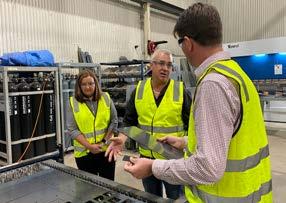
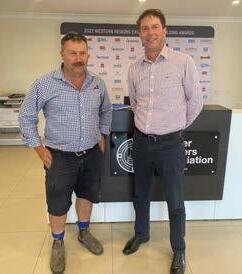
Visited the State’s central west in March to meet local business leaders and hear from businesses about their challenges and concerns. One business that stood out was Almighty Industries in Orange, which builds custom cars and trucks for government and industry. The business started small but now employs more than 50 people and is providing an outstanding opportunity for many young apprentices.
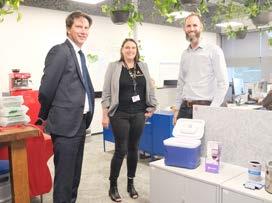

Met with small businesses to discuss local business conditions and issues of concern which included challenges in getting security staff and costs associated with training. It was clear that small businesses in the hospitality sector were facing serious challenges, including staff shortages in key areas.


Presentation to the Australian Association of Certifiers National Conference in June on the importance of small businesses using data and analysis to strengthen their operations.


Visited Broken Hill in August, hearing first-hand experiences from small businesses. Interest rates, energy prices and skill shortages were front and centre of their concerns. Despite the challenges there was also a sense of optimism. The Commissioner met with local business groups and media to discuss support provided by the Commission.
The Commission launched its new website in November, featuring a fresh look and feel and enhanced functionality to make it easier for small businesses to find the help they need and ensure they get the latest news and information.
Improvements include:
• A cleaner, more modern design
• Enhancements in navigation and content structure
• An improved search function and key links menu, accessible from every page
• Content updates and refinement
The Commission welcomes feedback on the new website and suggestions for improvement via the feedback tool on the site at smallbusiness.nsw.gov.au
526,360
unique website visits in 2023

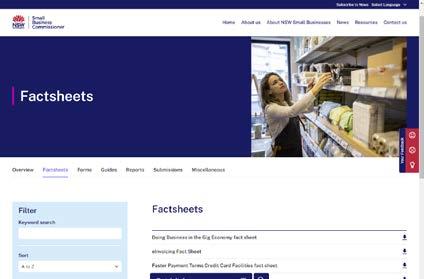
1. Could skilled migration help your business
https://www.smallbusiness.nsw.gov.au/help/ common-questions/could-skilled-migration-helpyour-business
2. Getting approval for a home business
https://www.smallbusiness.nsw.gov.au/help/ common-questions/getting-approval-for-a-homebusiness
3. What is a company?
https://www.smallbusiness.nsw.gov.au/help/ common-questions/what-is-a-company
4. Commercial leases and Covid-19 FAQs
https://www.smallbusiness.nsw.gov.au/help/ common-questions/commercial-leases-andcovid-19-faqs
5. What are outgoings?
https://www.smallbusiness.nsw.gov.au/aboutretail-leases/retail-lease-basics#outgoings
6. Surrendering a retail or commercial lease
https://www.smallbusiness.nsw.gov.au/aboutretail-leases/retail-lease-basics#surrendering-alease
7. How do lease options work?
https://www.smallbusiness.nsw.gov.au/aboutretail-leases/retail-lease-basics#lease-options
8. Lease disclosure statements
https://www.smallbusiness.nsw.gov.au/ about-retail-leases/retail-lease-basics#leasedisclosure-statements
9. Transferring your lease
https://www.smallbusiness.nsw.gov.au/aboutretail-leases/retail-lease-basics#transferringyour-lease
10. Retail Bonds: Lease Security
https://www.smallbusiness.nsw.gov.au/aboutretail-leases/retail-lease-basics#lease-security
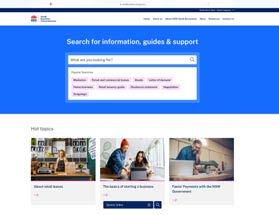


With more than one third of NSW small business owners born overseas, it is vital that the Commission continues to reach out to businesses in a variety of languages to ensure all small businesses are aware of the support available to them. Communicating effectively with our culturally and linguistically diverse (CALD) small businesses plays a key role in supporting and strengthening local economies and communities.

The Commission’s website is available in more than 130 languages and we proactively promote our services in the 5 non-English languages most spoken by small business owners and operators: Chinese (traditional and simplified), Vietnamese, Korean, Thai and Arabic.
The Commission also reaches out to small businesses through multicultural broadcasters and by engaging with business chambers in multicultural areas.






The Commission delivered the 7th successful NSW Small Business Month in October 2023.
There were more than 700 events in suburbs, towns and cities across the State, attended by 24,000 people. A survey of attendees showed 94 per cent were very satisfied or satisfied with their participation in NSW Small Business Month and 79 per cent agreed that they felt more confident in their business afterwards.
711
NSW Small Business Month brings together business experts, industry leaders and successful small businesses to help small businesses learn new skills, improve their operations and discover new opportunities.
Find out more at smallbusinessmonth.nsw.gov.au
95%
were very likely or likely to attend a future NSW Small Business Month
24,000
272
220 events delivered during Small Business Month people attended Small Business Month events
94%
94%
were very likely or likely to recommend Small Business Month of attendees were very satisfied or satisfied with their participation in NSW Small Business Month
79%
89%
of attendees strongly agreed or agreed with the statement “the activity provided me with information I intend to apply to my business.”
strongly agreed or agreed that they feel more confident in their business after participating
of attendees agreed that their awareness of government support had increased as a result of NSW Small Business Month collaboration partners joined the program organisations approved for grants to host events
66%

Sutherland Shire Business Chamber and Cronulla Chamber of Commerce worked with the local community to deliver the Shire Thrive: My Small Business Month Breakfast.
Keynote speaker Carlii Lyon delivered a presentation on personal branding and how it can help attract new customers, followed by a panel discussion on business resilience.

International trade consultant China and Beyond held two webinars. How to Protect Intellectual Property in Global Trading, provided insights on commercial and legal strategies to protect patents, trademarks, technology knowhow and copyrights when engaging in international product sourcing or expanding into global markets. Minimising Risks When Sourcing and Outsourcing Overseas outlined the risks and pitfalls associated with sourcing products and services from overseas suppliers, along with practical measures to minimise those risks.
Zero Point Development held four webinars on video production, search engine optimisation (SEO), and digital marketing. The webinars were attended by 370 people and were well received, particularly the two webinars on SEO.


Maitland Business Chamber held its Small Business Summit with support from Maitland City Council. Stalls included Service NSW for government support, the NSW Small Business Commission for advocacy and mediation services, Lifeline for Mental Health and BNI for business referrals and networking. Nimbler Digital hosted a workshop on artificial intelligence and The Grants Guy helped businesses with accessing and writing successful grant submissions.


The Small Business Month closing event at the Sydney Startup Hub featured renowned business strategist and futurist Michael McQueen speaking about the cutting-edge strategies and trends that are shaping the future of small businesses.
In 2023 the Commission marked 10 years of supporting small businesses. The Minister for Small Business Steve Kamper was on hand to help us celebrate the occasion and present awards to long-serving staff members.
The Commission was established in its present form in 2013 with the passage of the NSW Small Business Commissioners Act
Over the past decade the Commission has responded to over 230,000 requests for assistance and conducted more than 4,000 mediations.





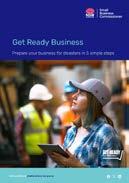



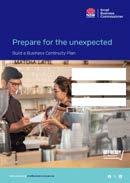


First published March 2024
T24/00586
© State of New South Wales through the NSW Small Business Commission 2023. The publication is copyright. You may download, display, print and reproduce this material provided that the wording is reproduced exactly, the source is acknowledged, and the copyright and disclaimer notice are retained. For any other use, please contact the NSW Small Business Commission for permission:
Phone: 1300 795 534
Web: smallbusiness.nsw.gov.au/contact
Address: 4 Parramatta Square, 12 Darcy Street Parramatta NSW 2150
Aside from these uses or any other uses allowed under the Commonwealth’s Copyright Act 1968, all rights are reserved.
Disclaimer: The information contained in this publication is based on knowledge and understanding at the time of writing and may not be accurate, current or complete. The State of New South Wales (including the NSW Small Business Commission), the author and the publisher take no responsibility, and will accept no liability, for the accuracy, currency, reliability or correctness of any information included in the document (including material provided by third parties). Readers should make their own enquiries and rely on their own advice when making decisions related to material contained in this publication.